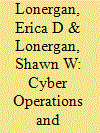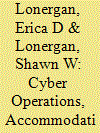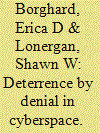|
|
|
Sort Order |
|
|
|
Items / Page
|
|
|
|
|
|
|
| Srl | Item |
| 1 |
ID:
148084


|
|
|
|
|
| Summary/Abstract |
This article contends that states that employ cyber proxies are confronted with twin dilemmas. First, governments risk a Promethean dilemma when they equip cyber proxies with tools that could be turned against them. Second, governments risk a dilemma of inadvertent crisis escalation by empowering proxies with more expansive, or less restrained, political agendas that may exceed their mandates. The essay explores how states can manage the risks associated with these dilemmas and the conditions under which they are likely to backfire.
|
|
|
|
|
|
|
|
|
|
|
|
|
|
|
|
| 2 |
ID:
188891


|
|
|
|
|
| Summary/Abstract |
In response to our article, “Cyber Operations, Accommodative Signaling, and the De-Escalation of International Crises,” we are delighted to engage with three scholars: Brandon K. Yoder, Fiona S. Cunningham, and Michael P. Fischerkeller. By way of background, this project grew out of our prior research on cyber operations’ limitations for coercion and the paucity of evidence that cyber operations cause escalation.Footnote1 Our inherent intuition was that cyber operations may be useful for conveying an aversion to significantly escalate disputes for some of the same reasons they are poor tools of coercion—and that this could help account for the relatively robust empirical finding that cyber operations are not associated with crisis escalation.Footnote2 Therefore, one part of our argument rests on cyber operations’ relatively limited effects compared to other tools at a state’s disposal.
|
|
|
|
|
|
|
|
|
|
|
|
|
|
|
|
| 3 |
ID:
188212


|
|
|
|
|
| Summary/Abstract |
Signaling is a core element of international crisis bargaining and coercive diplomacy. To succeed in crises, a state must convey to its opponent that it possesses the capability to impose an advantageous outcome and that it is resolved to do so, while also managing the risks of unintended escalation and war. However, less studied in signaling literature is how states can use signals for the purposes of managing escalation risks or even de-escalating crises. In this article, we develop a theory of signaling in cyberspace. We argue that, although cyber operations are not particularly well suited as costly signals of resolve or capabilities in the context of coercive diplomacy, they have a distinct utility for signaling to manage escalation risks. We build a framework organized around the causal mechanisms of accommodative signaling in cyberspace and test it against a set of comparative case studies. We find that cyber operations can act as accommodative signaling under some conditions, particularly when decision makers are faced with managing tensions between simultaneously signaling to domestic audiences and adversary governments.
|
|
|
|
|
|
|
|
|
|
|
|
|
|
|
|
| 4 |
ID:
190773


|
|
|
|
|
| Summary/Abstract |
Many scholars and practitioners are unconvinced that cyber deterrence is possible. This article aims to demonstrate why some of this skepticism is misplaced, as well as provide greater clarity and conceptual rigor to the proliferation of arguments within the United States about deterrence in cyberspace. Specifically, we argue that cyber deterrence frameworks that draw from the traditional nuclear deterrence literature and the logic of deterrence by punishment are mismatched to deterrence challenges in cyberspace. Instead, we advocate for a deterrence by denial approach, but one that is oriented around counter-cyber operations rather than simply improving defenses. While there has been some scholarship and work by practitioners that implicitly rests on a deterrence by denial logic, they suffer from a lack of systematic assessment of how traditional denial concepts, especially those developed in the conventional deterrence literature, could be extended to cyberspace. Therefore, in this article, we review different deterrence concepts in theory and practice, articulate a logic of cyber deterrence by denial, and provide policy recommendations for the United States.
|
|
|
|
|
|
|
|
|
|
|
|
|
|
|
|
| 5 |
ID:
153178


|
|
|
|
|
| Summary/Abstract |
What are the dynamics of coercion in cyberspace? Can states use cyber means as independent tools of coercion to influence the behavior of adversaries? This article critically assesses traditional coercion theory in light of cyberspace's emergence as a domain in which states use force, or its threat, to achieve political objectives. First, we review the core tenets of coercion theory and identify the requisites of successful coercion: clearly communicated threats; a cost–benefit calculus; credibility; and reassurance. We subsequently explore the extent to which each of these is feasible for or applicable to the cyber domain, highlighting how the dynamics of coercion in cyberspace mimic versus diverge from traditional domains of warfare. We demonstrate that cyber power alone has limited effectiveness as a tool of coercion, although it has significant utility when coupled with other elements of national power. Second, this article assesses the viability and effectiveness of six prominent warfighting strategies in the traditional coercion literature as applied to the cyber domain: attrition, denial, decapitation, intimidation, punishment, and risk. We conclude that, based on the current technological state of the field, states are only likely to achieve desired objectives employing attrition, denial, or decapitation strategies. Our analysis also has unique implications for the conduct of warfare in cyberspace. Perhaps counterintuitively, the obstacles to coercion that our analysis identifies may prompt states to reevaluate norms against targeting civilian infrastructure.
|
|
|
|
|
|
|
|
|
|
|
|
|
|
|
|
|
|
|
|
|